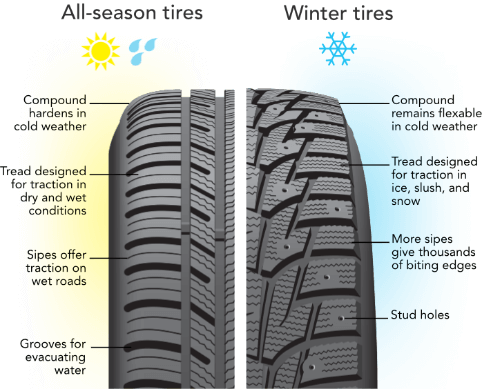The key to determining whether or not you might need snow tires as well as all season tires depends on you knowing the difference between the two and identifying the particular needs for your own vehicle in your specific climate.

What Are All Season Tires?
As soon as cars leave the factory, they are usually fitted with All Season tires. This type of tire has been designed to give drivers a quiet ride while boasting a decent tread life and good fuel economy, so it’s easy to see why they’ve proved to be so popular. All Season tires offer a very versatile performance, and have been designed to perform well under a wide range of conditions, from light winter driving to wet road surfaces, offering the best of both worlds when compared to winter and summer tires.
Do All Season Tires Offer All The Benefits Of Both Winter And Summer Tires?
Although All Season tires do boast a lot of the features of both winter and summer tires, they don’t offer all of the benefits of either. This is because there has had to be some compromise in the effort to supply a good level of performance across a wide range of road conditions.
When compared to a summer tire, an All Season tire won’t be capable of providing the same strong grip or sharp handling, however when compared to a winter tire, an All Season tire can’t handle extreme ice and snow in the safe effective manner either.
If you imagine that All Season tires are very similar to a pair of tennis shoes, you’ll get a pretty good idea – yes, you can wear tennis shoes all year round, however they’re not going to be the optimal choice in every situation. You’re much going to prefer the safety and comfort that comes with wearing a pair of boots to trek through the snow, and flip flops or sandals are going to be a better choice if you’re heading out to the beach on a hot day.
Put in basic terms, All Season tires represent a brilliant choice if you live in a moderate client and encounter no extreme snow, ice or cold during the winter.
What About Winter Tires?
If you’re driving in deep snow or across icy surfaces, you’re going to need the right tires to cope with the hazardous situation. Winter road conditions can be extremely unpredictable, and whether you’re dealing with black ice or falling snow, your tires will be challenged with providing more traction than at any other time of year.
The combination of snow, ice and cold temperatures are best met by fitting winter tires to your vehicle, since they have been designed specifically to perform well in wintry conditions. There are a number of features which set winter tires apart from the competition when it comes to winter driving:
Tread Rubber
When you’re driving in very cold temperatures, you’ll find that a summer or All Season tire’s tread rubber will start to stiffen, becoming less capable of providing enough traction to keep you stable and safe on the road. Winter tires combat this problem by using tread rubber compounds which have been designed to stay flexible in order to allow the tire to get a better grip on the road even on the iciest days.
Tread Patterns And Depth
Another unique feature found in winter tires is a deeper tread depth and a unique tread pattern. A deeper tread depth will reduce the amount of snow which can build up on the tire, providing optimal traction on snowy surfaces. Meanwhile, the tread pattern of a winter tire has been designed to channel the slush and snow while expelling water.
Biting Edges
A winter tire will also feature more biting edges as well as high sipe densities – basically, a larger number of small slits in the tire tread which provides excellent traction on icy roads.
So, Which Should I Choose – A All Season Tire Or A Snow Tire?
If you’re not sure which type of tire to have fitted to your vehicle, the answer is to look at the conditions you will be driving in and the climate in which you live. If you’re likely to just have a handful of small snow flurries over the course of the year, and icy surfaces are the exception rather than the rule, a set of All Season tires will almost certainly be sufficient to meet your needs.
However, if you are driving in an environment where you know that there are extended periods of the year when snow and ice will cause an issue, fitting a set of winter tires isn’t just advisable, it’s an absolute necessity to guarantee your safety and well-being.
When you’ve decided to fit snow tires for the winter season, it’s important to always install a complete set. If you only change the front tires, it becomes increasingly likely that your rear tires will skid. Conversely, if you only put snow tires on your car’s rear wheels, you could well find that your front tires will lose traction, making steering your vehicle virtually impossible.
If you’ve fitted winter tires, it’s important to remember that you need to put a set of All Season tires back on when spring returns. Although winter tires are definitely the best choice in an extreme climate, they will always wear down more rapidly if you are driving on dry, warm roads.
Originally posted 2023-12-26 07:48:52.